|
|
|
Sort Order |
|
|
|
Items / Page
|
|
|
|
|
|
|
| Srl | Item |
| 1 |
ID:
152997
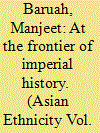

|
|
|
|
|
| Summary/Abstract |
Edward Gait’s A History of Assam was first published in 1906, later revised in 1926. The book has remained one of the most popular ‘textbooks’ in Assam, especially as the first modern historiography on the subject. This article looks at two broad issues in this regard. First, it looks at the contradictions that Gait was faced with in terms of his imperial ideology and interpreting the historical sources of an imperial frontier. Second, it tries to situate the relevance of the above point vis-à-vis some of the contemporary attempts at re-framing the region as an international borderland. In conclusion, the article looks at the reception of Gait and his appropriation into different discourses within Assam. A point explored is whether despite its contradictions, was Gait’s A History of Assam part of a wider, dynamic context of early twentieth century Assam, which made the book an important academic and political intervention of its times.
|
|
|
|
|
|
|
|
|
|
|
|
|
|
|
|
| 2 |
ID:
157035
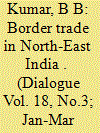

|
|
|
| 3 |
ID:
180253
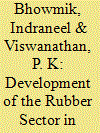

|
|
|
|
|
| Summary/Abstract |
The development of the rubber sector in North East (NE) India in recent decades is an outcome of the government’s import substitution initiatives in the post-independence period. The article attempts to trace the process of evolution and development of the rubber sector in the region and observes that the adopted policies for rubber expansion had been framed under the narrow innovation system model, whereby the localised knowledge and learning, as well as practices, remained completely ignored in the promotion of the sector. The lack of region-specific rubber development strategies with appropriate linkages supported by institutional systems are the critical gaps that undermine the sustainable growth of the rubber sector in the NE region. Eventualities of the sort call for reinventing policies and programmes under the broad innovation system framework, so as to reap the advantages emanating from the integration of the region with the global market and facilitate greater diversification and sustainable growth of the rubber sector.
|
|
|
|
|
|
|
|
|
|
|
|
|
|
|
|
| 4 |
ID:
165137
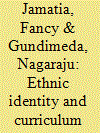

|
|
|
|
|
| Summary/Abstract |
The paper aims to understand the role of school textbooks and curriculum in shaping the majority and minority identity in Tripura. Though Tripura is a tribal majority state, the partition of the country led to the influx of Bengali Hindus. Based on the sociological analysis of history and language textbooks in Tripura schools, the paper argues that the state is systematically projecting the Bengali Hindu identity as ideal and marginalising the identity of diverse tribal groups. Dominant language, religion and cultural practices of the Bengalis were celebrated whereas the linguistic diversity and spiritual pathways of the subaltern communities are either ignored or mentioned peripherally. Since the inception of formal education in Tripura, the state failed to develop the tribal languages and script which led to the ideological submission of ethnic groups to the dominant identity. Thus, Tripura witnessed an ideological shift from the multiple identities to monolithic identity works on the principle of Banglanization of the state and civil society.
|
|
|
|
|
|
|
|
|
|
|
|
|
|
|
|
| 5 |
ID:
185497
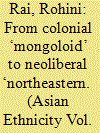

|
|
|
|
|
| Summary/Abstract |
Contemporary India has witnessed a rise in racism discourse, central to which are people from North-East and Himalayan regions, collectively referred to as ‘Northeasterns’. This has recentred ‘race’ and racism as being a theoretical-political problem of contemporary India itself. However, existing literature shows that there is stark under-theorisation of ‘race’ and racism in Indian context. Drawing from ethnographic research and applying the racialization approach, this paper argues that ‘race’ in India is a postcolonial-neoliberal construct, whereby colonial ‘Mongoloid’ is reconstructed into neoliberal ‘Northeastern’, such that ‘race’ in India acts as a layered mode of constructing identity and difference. It further argues that the ‘Northeastern’ category emerges as a result of exclusion from the ‘Indian’ category, which itself is racialized along Hinduised-Aryanised lines, such that racism is a product of a postcolonial centre-periphery power-relation between India and its North-East; thereby making way for critical ‘race’ scholarship in the Indian context.
|
|
|
|
|
|
|
|
|
|
|
|
|
|
|
|
| 6 |
ID:
154136
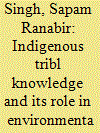

|
|
|
|
|
| Summary/Abstract |
Indigenous knowledge is the local knowledge that is unique to a culture or society. It is also known by other names such as: ‘local knowledge’, ‘folk knowledge’, ‘people knowledge’, ‘traditional wisdom’ or traditional science’. It is passed from generation to generation, usually by word of mouth and cultural rituals, and has been the basis for agriculture, food preparation, health care, education, conservation and the wide range of other activities that sustain societies in many parts of the world (UNESCO; 2010).
|
|
|
|
|
|
|
|
|
|
|
|
|
|
|
|
| 7 |
ID:
162712
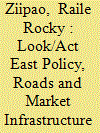

|
|
|
|
|
| Summary/Abstract |
The socio-politico-economic scene in India’s North-east region has guided certain aspects of the country’s domestic and international policy. The Act East Policy (AEP) of the government of India aims to build relations with the countries of South-East Asia, including trade relations, for which the north-east serves as the gateway. This article seeks to analyse the relevance of the policy: How is it grounded in the complex region of north-east India? In what way can it impact the region? The article argues that the new national road infrastructure bypasses the local economy, and posits the need to link rural infrastructure—especially connectivity and local markets—with regional, national and international markets.
|
|
|
|
|
|
|
|
|
|
|
|
|
|
|
|
| 8 |
ID:
174796
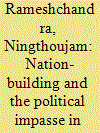

|
|
|
|
|
| Summary/Abstract |
This paper discusses the politics of India’s nationalising policies towards the ‘region’ called the ‘north-eastern region’ in general, and Manipur in particular, of the post-colonial Indian state. Such policies are informed by a two-pronged strategy, the first by militarism and the second by what I identify as developmentalism. This strategy stresses the unilateral nature of India’s nation-building projects, and how it has deliberately or inadvertently brought dissatisfaction among the native population when they have unmasked the disruptive substance of nation-building approach to this hinterland.
|
|
|
|
|
|
|
|
|
|
|
|
|
|
|
|
| 9 |
ID:
151471
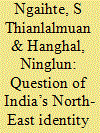

|
|
|
|
|
| Summary/Abstract |
The question of India’s North-East identity and solidarity has been a subject of debate among scholars, academicians and others. Apologia to a collective North-East believes in the existence of North-East identity and solidarity. Against the apologia’s stands are the critique who rather brushed aside North-East collectivity and questioned the clubbing together of the region as one entity. This article highlights some of the contrasting views of understanding India’s North-East, and takes the issue further by proposing to call these contending paradigms as the ‘apologists’ and the ‘sceptics’. We further argue that despite their apparent ‘antithesis’, both paradigms are related.
|
|
|
|
|
|
|
|
|
|
|
|
|
|
|
|
|
|
|
|
|